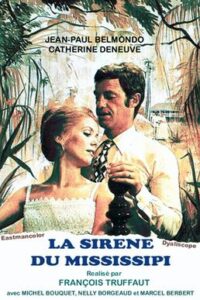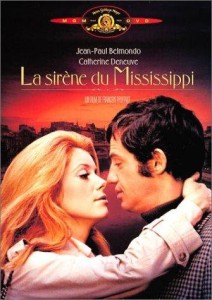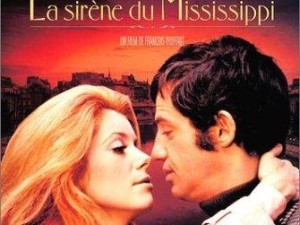Mississippi Mermaid [La Sirène du Mississippi] **** (1969, Jean-Paul Belmondo, Catherine Deneuve, Michel Bouquet) – Classic Movie Review 3,024
Ah, yes, love leads to an uncertain future when you lie, cheat, rob and murder. François Truffaut turns a Cornell Woolrich novel into the moody and engaging 1969 film noir Mississippi Mermaid with the right stars in Jean-Paul Belmondo and Catherine Deneuve.
Writer-director François Truffaut freely adapts the 1947 novel Waltz into Darkness by Cornell Woolrich (under the pen name of William Irish) into the moody and engaging 1969 film noir romantic thriller Mississippi Mermaid [La Sirène du Mississippi], with the right stars in Jean-Paul Belmondo, Catherine Deneuve and Michel Bouquet.
Truffaut is returning to the work of Woolrich, which he had already used as the basis for The Bride Wore Black. Woolrich is the author of Rear Window, filmed by one of Truffaut’s role models Alfred Hitchcock, and the story has links to Vertigo, so this can certainly be considered a Hitchcock homage.
In the gripping, involved plot, wealthy Réunion island tobacco planter Louis Mahé (Jean-Paul Belmondo) eagerly awaits the arrival of his bride-to-be, Julie Roussel, the woman he has corresponded with through the personals column of a French newspaper.
When a lovely woman (Catherine Deneuve) greets him at the dock as Julie Roussel, he is surprised by her great beauty and does not recognise her, for she is not the woman in the photo he received. She explains she sent the photo of a neighbour to ensure his sincerity and he confesses he lied too and was not the plantation foreman but its wealthy owner.
The handsome couple quickly marry, but the lady turns out to be a thieving trickster, who makes off with Louis’ money. He gives Julie access to his bank accounts, but a letter from Julie’s sister, Berthe Roussel (Nelly Borgeaud), demands to know where Julie is, and then Louis finds Julie has vanished with nearly all the money in his bank accounts. Berthe arrives on the scene and tells him she saw Julie board the steamer Mississipi and that his wife is not Julie. Together they pay a private detective called Comolli (Michel Bouquet) to track down the impostor.
Later, in Nice, France, he sees the impostor on TV, dancing at a nightclub in Antibes. He buys a gun and travels to Antibes, intent on killing her. Revealing her real name is Marion Vergano, she tells him that a heartless gangster, Richard, who was with her on the Mississipi, hatched a plot to kill Julie and send Marion in her place to rob Louis. She tells Louis that she loves him, and Louis forgives her. But it turns out that she is hell bent on bumping him off.
Passion mixes with film noir in this grand Truffaut movie, which involves and entertains quite deliciously, even if it falls just slightly short of his finest work. In their glorious prime, French cinema icons Belmondo and Deneuve can’t help riveting the attention, both physically and in their very considerable acting performances. This so-called thriller is as much Truffaut’s screen love affair with them as The Bride Wore Black is Truffaut’s homage to Jeanne Moreau.
And naturally there is fine work on the characterful cinematography by Denys Clerval, filming on eye-catching locations in Réunion, Aix-en-Provence, Antibes, Lyon and Nice, and on the atmospheric score by Antoine Duhamel. Truffaut’s films are always a joy technically.
What starts as a very rich and satisfying film noir thriller becomes a heady, very French romantic melodrama film. The second half of a long, epic movie (123 minutes) is perhaps less engaging than the first, as the Marion Vergano character starts to get very capricious and hard to love, while Louis Mahé starts to do crazy, inconsistent things in the name of his amour fou, Because it is Deneuve and Belmondo in their absolute prime, they get away with it, just, and therefore so does Truffaut, who certainly turns up the sexual heat every now and again to explain what it’s all about. At the end, all is clear theme-wise when Marion tells Louis: ‘I’m learning what love is, Louis. It’s painful.’ Ah, finally. But, at the end, all is not clear plotwise, as the film ends in midair in a snowstorm. Ah, frustrating.
Ah, yes, love leads to an uncertain future, especially if you lie, cheat and rob – and commit murder.
The film is entirely focused on the very starry Belmondo and Deneuve, who have immense amounts of screen time and extended, sometimes rather pretentious dialogue (even Deneuve who arrives a little late and disappears for a while), so it is frustrating that Michel Bouquet as Comolli, Nelly Borgeaud as Berthe Roussel and Marcel Berbert as Louis’ business partner Jardine have so little to do, especially when their little is so good. The three are key characters in the complex, complicated plot. Truffaut is writing the screenplay. Is he sometimes losing the plot? Given Truffaut’s frustrations with The Bride Wore Black, it is perhaps surprising that he returned to adapting another work by Cornell Woolrich, but perhaps he was seeking to put things right in his own mind.
Crucially, the film remains contrived and artificial, a movie artifice with no relation to any kind of reality, but nevertheless the two stars keep it engrossing through star allure and strong performances, and Truffaut keeps it involving through sheer determined skill.
The detective Comolli is named after an editor of French film magazine Cahiers du Cinema, where Truffaut had worked as a critic. Truffaut previously used the house where the couple hide in Switzerland as the location of the gangsters’ hideout in Shoot the Pianist. He filmed in chronological order to develop the relationship between the two main characters in a natural way, each night re-writing the next day’s scenes.
Mississippi Mermaid is remade as Original Sin in 2001 with Antonio Banderas and Angelina Jolie.
In 1962 François Truffaut wanted Belmondo to play the lead in an adaptation of Fahrenheit 451 but that did not happen at the time, with Belmondo preferring to make two movies with Jean-Pierre Melville. Belmondo said he preferred making adventure films like That Man from Rio (1964) to the intellectual movies of Alain Resnais or Alain Robbe-Grillet, ‘but with François Truffaut I’d be willing to try’. It had to wait to 1969 for Mississippi Mermaid. And he did work with Resnais on his arty 1974 film Stavisky.
Jean-Paul Belmondo (9 April 1933 – 6 September 2021)
Derek Winnert 2021 Classic Movie Review 3,024
Link to Derek Winnert’s home page for more reviews: http://derekwinnert.com/





